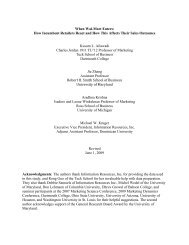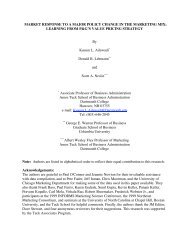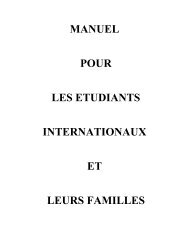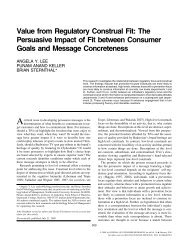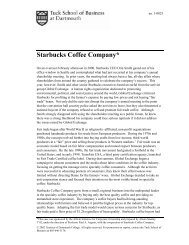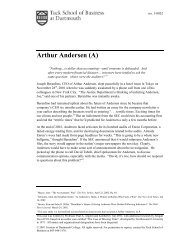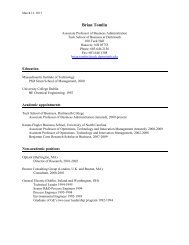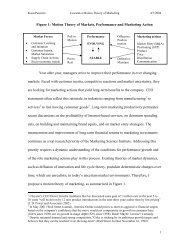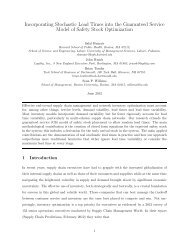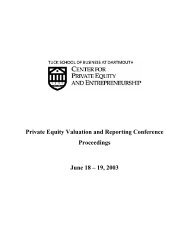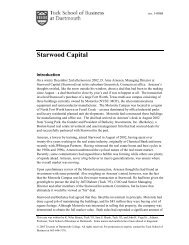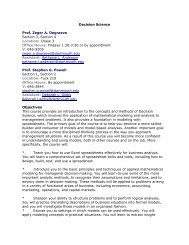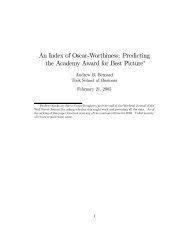tax notes international - Tuck School of Business - Dartmouth College
tax notes international - Tuck School of Business - Dartmouth College
tax notes international - Tuck School of Business - Dartmouth College
You also want an ePaper? Increase the reach of your titles
YUMPU automatically turns print PDFs into web optimized ePapers that Google loves.
ut will insist on <strong>of</strong>fsetting <strong>tax</strong> cuts in one area with<br />
increases in another, such as with the VAT increase to<br />
<strong>of</strong>fset the payroll <strong>tax</strong> reduction.<br />
Peter Szijjarto, spokesman for the right-wing opposition<br />
Hungarian Civic Union, labeled Gyurcsany’s<br />
January 25 meeting a failure, according to a January<br />
26 report in The Budapest Times.<br />
The Alliance <strong>of</strong> Free Democrats, a fellow left-wing<br />
party to Gyurcsany’s Hungarian Socialist Party, said in<br />
a statement that while it applauds Gyurcsany’s desire<br />
to reduce <strong>tax</strong>es and contributions, it questions his earnestness<br />
in light <strong>of</strong> a December 2008 statement in<br />
which he said that <strong>tax</strong> cuts in 2009 or 2010 would be<br />
impossible. The Alliance <strong>of</strong> Free Democrats called<br />
Gyurcsany’s inconsistency ‘‘harmful’’ to the Hungarian<br />
economy.<br />
The parties were scheduled to meet in an extraordinary<br />
session <strong>of</strong> parliament on January 29 to discuss<br />
the worsening economy and the government’s proposed<br />
legislation. The government plans to submit the<br />
most pressing bills to the parliament by mid-March to<br />
facilitate an effective date <strong>of</strong> July 1, Gyurcsany said in<br />
a statement.<br />
India<br />
♦ Randall Jackson, Tax Analysts.<br />
E-mail: rjackson@<strong>tax</strong>.org<br />
Indian PE Not Responsible for<br />
Withholding, Tax Tribunal Says<br />
The Mumbai Income Tax Appellate Tribunal on<br />
December 5 issued its ruling in DCIT v. Stock Engineer<br />
and Contractors BV, clarifying the withholding <strong>tax</strong> obligation<br />
on payments made to nonresidents by an Indian<br />
permanent establishment <strong>of</strong> a Dutch company, as well<br />
as the deductibility <strong>of</strong> some expenses for such a PE.<br />
In the case at issue, which related to assessment<br />
year 2000-2001, Stock Engineer and Contractors (the<br />
assessee), a company incorporated in and resident <strong>of</strong><br />
the Netherlands, was engaged in the design and construction<br />
<strong>of</strong> oil, gas, and petrochemical plants. It<br />
signed a contract with an Indian oil company for the<br />
engineering, procurement, and construction <strong>of</strong> a facility<br />
in India on a turnkey basis. For that purpose, the<br />
assessee set up project and site <strong>of</strong>fices in India (an Indian<br />
PE) after obtaining the due regulatory approval.<br />
The assessee in turn subcontracted a part <strong>of</strong> the work<br />
to its Malaysian subsidiary.<br />
Under that agreement, the Malaysian subsidiary was<br />
to supply personnel to the assessee for the purpose <strong>of</strong><br />
INDIA<br />
executing the Indian project. Those personnel stayed in<br />
India for a period <strong>of</strong> more than six months during the<br />
year under consideration.<br />
Separately, the assessee also engaged a U.K. company<br />
to deploy employees for supervision <strong>of</strong> the Indian<br />
project, and another Dutch company to provide engineering<br />
services. Both <strong>of</strong> those companies were unrelated<br />
to the assessee.<br />
The personnel <strong>of</strong> the U.K. company were deployed<br />
in India for 135 days. The assessee did not withhold<br />
any Indian income <strong>tax</strong> when paying the Malaysian,<br />
U.K., and Dutch suppliers. (The assessee also had<br />
some employees at its head <strong>of</strong>fice who dedicated part<br />
<strong>of</strong> their time providing technical support to the Indian<br />
PE; however, none <strong>of</strong> those employees visited India for<br />
the project work.)<br />
During the 2000-2001 assessment year, the assessee<br />
deducted the payments it made to the Malaysian subsidiary<br />
and the unrelated U.K. and Dutch companies<br />
in computing the Indian PE’s <strong>tax</strong>able income. The assessee<br />
also deducted part <strong>of</strong> the salary cost incurred by<br />
the head <strong>of</strong>fice for its employees based on the number<br />
<strong>of</strong> hours the employees spent on the Indian project.<br />
In the course <strong>of</strong> assessment proceedings, the <strong>tax</strong><br />
<strong>of</strong>ficer concluded that the assessee was subject to a<br />
withholding <strong>tax</strong> obligation on the payments it made to<br />
the various service suppliers. Because no <strong>tax</strong> was withheld,<br />
those payments were not deductible in computing<br />
the <strong>tax</strong>able pr<strong>of</strong>its <strong>of</strong> the Indian PE, 1 the <strong>tax</strong> <strong>of</strong>ficer<br />
said.<br />
In particular, the <strong>tax</strong> <strong>of</strong>ficer took the position that<br />
the Malaysian subsidiary had a PE in India under article<br />
5(4)(a) <strong>of</strong> the India-Malaysia income <strong>tax</strong> treaty,<br />
which states that a PE is created if supervisory activities<br />
are carried out in India for more than six months<br />
in connection with a construction, installation, or assembly<br />
project in India.<br />
The <strong>tax</strong> <strong>of</strong>ficer also held that the U.K. company had<br />
a PE in India under article 5(2)(k) <strong>of</strong> the India-U.K.<br />
income <strong>tax</strong> treaty, which states that a services PE is<br />
created if the aggregate stay <strong>of</strong> the personnel in India<br />
exceeds 90 days.<br />
Regarding the payment to the Dutch company, the<br />
<strong>tax</strong> <strong>of</strong>ficer held that it constituted a payment for technical<br />
services, which is subject to <strong>tax</strong> under the India-<br />
Netherlands income <strong>tax</strong> treaty.<br />
1 Failure to meet the withholding <strong>tax</strong> obligation leads to,<br />
among other things, the denial <strong>of</strong> a <strong>tax</strong> deduction for the payment<br />
in question (ITA section 40(a)(i)). The withholding <strong>tax</strong> obligation<br />
in the case <strong>of</strong> payment to a nonresident is triggered under<br />
ITA section 195 if the payment is subject to Indian income<br />
<strong>tax</strong> in the hands <strong>of</strong> the recipient.<br />
TAX NOTES INTERNATIONAL FEBRUARY 2, 2009 • 395<br />
(C) Tax Analysts 2009. All rights reserved. Tax Analysts does not claim copyright in any public domain or third party content.



